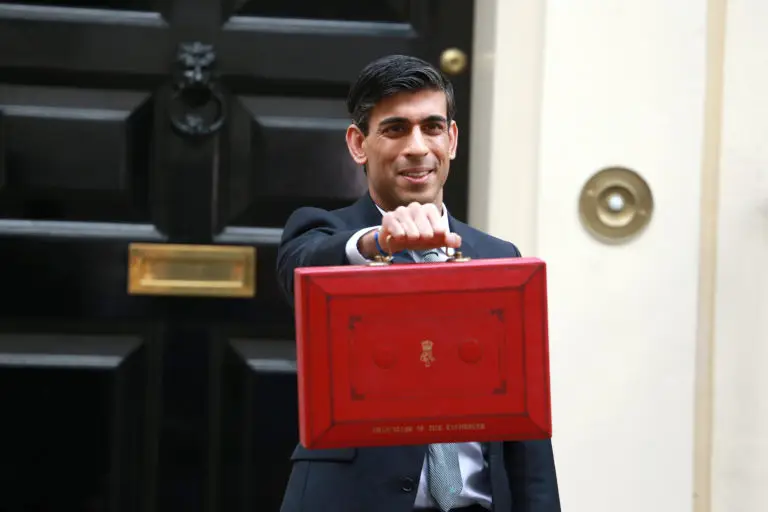The Chancellor will deliver the Autumn Budget this Wednesday, alongside the Spending Review. Below are PLMR’s five key things to look out for:
1. Fiscal Responsibility vs Economic Populism
The Chancellor himself is ideologically a deficit hawk, with an inclination towards fiscal conservatism. Yet he has presided over a massive increase in borrowing to deal with the pandemic (over £299 billion between 2020 and 2021) and an increase in taxes. The Conservatives have clearly recognised that raising taxes, borrowing, and breaking manifesto commitments is possible, so long as it can be justified to the public as an investment in public services – namely the NHS.
The Chancellor is clearly keen to promote himself as standing for fiscal responsibility, and has effectively ruled out any tax cuts in this Budget, even to unpopular business rates. However, long-gone are the Cameron days of laser focus on cutting the deficit to zero with a long term economic plan. With £6.9 billion for upgrading transport in the North, £3 billion for skills investment, and £5.9 billion to tackle NHS backlogs, this is a pragmatic Chancellor who recognises that further spending is required if the Conservatives are to retain their Red Wall voters and deal with the aftermath of the pandemic.
2. Increasing the Minimum Wage
At Conference, the Prime Minister outlined his vision for the UK to be a high-wage, low tax economy. To help realise this, it has been briefed that minimum wage will be increased to £9.50. This is a 6.6% pay rise aimed at tackling concerns around the growing cost of living, especially among young people working in retail and hospitality. This change puts some of the onus on businesses to step up and ensure their staff are fairly paid, which the Government has been keen on pushing.
There is political calculation behind this move, however. Average incomes in Red Wall seats are £1,100 lower than in typical Conservative seats and so this increase will go some way to rewarding these voters. Furthermore, this was almost certainly designed to outmanoeuvre Keir Starmer, who recently faced a damaging internal row within the Labour Party over his opposition to increasing the minimum wage. With the Conservatives continuing to encroach on Labour’s natural territory, it is an open question where Labour will go from here.
3. COVID-19
The Chancellor’s time in office has been dominated by the response to COVID-19 where he has used the tools of tax and spend to massively increase the size of the state. COVID looms over any measures the Chancellor is considering, as NHS bosses and SAGE members call for “Plan B” to be enacted. The Chancellor has so far refused these requests and has said there will be no “significant economic restrictions” to tackle rising cases. Instead, he is reliant on vaccine boosters as providing the UK with a path out of the pandemic. The Chancellor also notably does not want a return to any kind of furlough scheme.
This does not mean that action to address the damage caused by COVID-19 will not be present. The Treasury has actively briefed out the plans for further health spending to address the NHS backlog alongside investment to digitise and usher in the use of new technologies in the health system. However, not all Departments are to feel this “post-COVID” boost. It is expected that the Chancellor will reject calls to extend the school day and will not provide the Department for Education with anywhere near the £7bn they had proposed for the education catch up programme.
4. COP26 and Climate Change
This Budget comes five days before the UK hosts the COP26 Climate Summit. While the Chancellor has been keen to promote the green financing deals he introduced, he comes across as largely disinterested in climate policy and does not think it is a priority for voters.
Notably, the Treasury chose to publish their own analysis of Net Zero a week before the Budget rather than incorporate it. The Chancellor also chose to deliver the Budget before COP26, thus tying the hands of a Prime Minister known for announcing new funding measures at set piece moments. Overall, the Budget is expected to contain announcements on carbon capture and green jobs, but it is clear that it will not have the COP26 agenda as its centrepiece.
5. Delivering on the Levelling Up Agenda
In 2019, the Government was elected on a platform of “levelling up” the country, but the pandemic meant that this was effectively side-lined for much of the past two years. This Budget will need to put plans in motion now to ensure that the results of levelling up are felt by Red Wall voters come the next election.
The Budget does contain important spending commitments such as £6.9 billion worth of investment to improve Northern transport as well as £150 million to help small businesses outside London access vital funding. The Government also continues to introduce Freeports and hand out grants from the Towns Fund and the Levelling Up Fund. However, some of these will be reannouncements, and whether they will be enough to address years of regional inequality and quickly deliver the change and outcomes that people want to see and are able to feel in their daily lives, remains to be seen.





